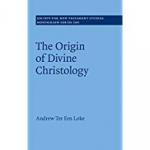Gerald R. McDermott
Everyday Glory: The Revelation of God in all of Reality
Grand Rapids, MI: Baker, 2018.
Available at Baker and Koorong
By Laura Thierry
Romans 1:20 declares that God’s ‘invisible attributes…have been clearly perceived, ever since the creation of the world, in the things that have been made.’ The Psalmist confidently proclaims that ‘the heavens declare the glory of God’ (Ps. 19:1). But can every day realities actually tell us about the glory of God? Can rocks and rain, bread and wine, science and sex really help us know God?
Such are the questions that frame Gerald R. McDermott’s Everyday Glory. And —with biblical integrity, sympathetic conversation with the great tradition of Christian thought, knowledgeable engagement with current scholarship, and winsome clarity —such are the questions that he faithfully and engagingly answers.
After a brief but broad discussion on the backdrop to these questions (namely, secularism and theological questions regarding our ability to see anything in creation clearly on account of our sin-stained vision), McDermott sets forward two contrasting figures from church history, namely, Jonathan Edwards and John Henry Newman, as strikingly similar vignettes of how Christian thinkers have engaged with these questions in the past. His basic answer (through these representatives) is that Christians have, up until very recently, seen creation (and indeed all of reality) as shining forth the great story of God’s redemption. That is, that ‘a tiny part of [that] story is told by each tiny part of the cosmos’ (8).
But how so? This understanding occurs through a ‘typological vision of reality’ (8). Typology in the Christian tradition is the concept that a thing (say marriage) serves as a ‘type’ of something else (Christ and the church) by pointing to and participating in that greater reality. This idea is what Everyday Glory goes on to expound and celebrate.
Perhaps the greatest highlight of the book is the strong case McDermott puts forward for the foundation of typology being found in God’s self-revelation in the canon of Scripture. This foundational chapter, after firing forth a succinct account of Scripture’s view of typology, allows us to sit with all our modernist squirms at the feet of Thomas Aquinas, Jonathan Edwards, and Edward Pusey, and to hear their wise reasoning in defense of typology.
Setting the stage with the book of God’s revelation of himself in the typology of Scripture, McDermott turns to God’s second book: Nature. This chapter serves as an exposition of what it means for the world to be, as G. M. Hopkins put it, ‘charged with the grandeur of God.’ The next seven chapters then unpack how this vision of Christian typology — of creation pointing to and participating in the story of the glory of God — works itself out in relation to science, law, history, animals, sex, sports, and world religions.
McDermott concludes by very briefly unpacking how this vision of reality has powerful potential to shape the Christian life and witness of believers in a secular age. The book finishes on a wise note, reminding enthusiastic readers afresh that this vision of reality, in all its goodness, is limited; and that types can only be seen as reflecting the glory of God when seen through the Spirit-enlightened eyes of faith.
All things considered, Everyday Glory proved a delightful read. It is in-depth enough to engage one’s mind at a scholarly level, but not so intense as to deter a curious lay reader. It would serve as a very fruitful resource for those considering how their ‘secular’ and ‘sacred’ lives intersect. I could imagine discussing it over good coffee with a group of Christian young professionals, or those thinking about the intersection of Christianity and the arts. But ultimately I would highly recommend this book to anyone wanting to press into the heritage of the great tradition of the Christian faith, and desiring to have their focus sharpened to see afresh a world ‘charged with the grandeur of God.’
Laura Thierry a PhD student at Ridley College, researching medieval hagiography, Christology, and theology of the body.












